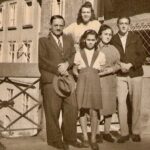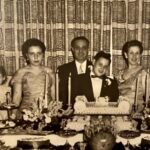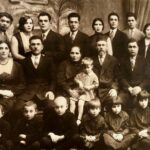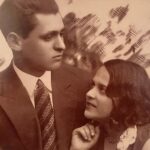Vivian Stockhamer was born in Lida, Poland in 1936 to Leibel Litovitz and Charna (Boyarski) Litovitz. Her father had 10 siblings and her mother had 3 siblings, all of whom were married with children and many of whom were living in Lida prior to the outbreak of World War II. From 1939 to 1941 Lida was occupied by the Russian Army. In 1941 the German Army invaded Lida and life became a nightmare. The Nazis immediately formed a ghetto which was surrounded by barbed wire so that no one could escape. Every day thousands of people were forced to work as slaves in dreadful conditions. On May 8, 1942, Vivian, her parents and her younger sister, Rochel, were awakened in the middle of the night by banging at the door and officers ordering them to dress and be out in five minutes and to follow the line in front. They walked for hours until arriving at what they soon discovered was a killing field. Vivian, a mere 6 years of age, remembers seeing mass human graves, surrounded by hundreds of Nazi S.S. Officers. The Nazis had a list of who would live and who would die. It was chaos and terror all around, with people screaming and crying. The Nazis ordered most people to the right to be killed but several thousand people were sent to the left to be spared temporarily for hard labour. In the midst of all the confusion and terror, one of Vivian’s uncles ran to the left. She was holding on to his jacket belt, and was pulled with him out of the death line where she was standing with her parents. When her father realized that Vivian was not with them, he told his wife to get her so that they would all perish together as a family. Vivian’s mother found her on the left side and attempted to cross back to the right side, but an S.S. Officer would not allow them to cross back to the right. Vivian and her mother watched as her father and sister and numerous other family members were killed barbarously. That day 6,700 Jews of Lida were murdered. Afterwards Vivian and her mother were taken back to the ghetto. Vivian’s uncle Leon Stoll worked as an accountant in the brewery in Lida. Leon and his wife, Sara, and their three children, Bella, Michael and Ann, got permission to live in the brewery, and through much negotiations, arranged for Vivian and her mother to stay with them for the next 16 months. On the morning of September 17, 1943, Vivian was startled by a lot of shooting and screaming as the Nazis burst into the ghetto and the brewery to capture the remaining Jews. She, along with her Aunt Sara and cousin Ann and 8 others hid in the attic of the brewery. When all seemed quiet, they came down the ladder, attached a rope to the small window of the second story apartment, and climbed down to the ground outside the brewery. They quickly disappeared into the woods; Vivian climbed out the window and fell on a small bundle of money. Vivian and her aunt and cousin, who wandered in the woods alone for weeks, were able to use that money to bribe local residents to help them find the partisans. Vivian later learned that her mother was gassed in Majdanek. Vivian, an orphan at age 7, spent 2 years in the woods with the partisans, until being liberated by the Russians in 1945 at age 9.
After spending time in D.P. camps in Austria and Germany, Vivian arrived at age 11 in Toronto on February 14, 1948 to live with her uncle, aunt and cousins. It was there that she met her late husband, Saul, also a Holocaust survivor with his own story of tragedy and miraculous survival as an orphaned teenager hiding in the woods in Ukraine.







